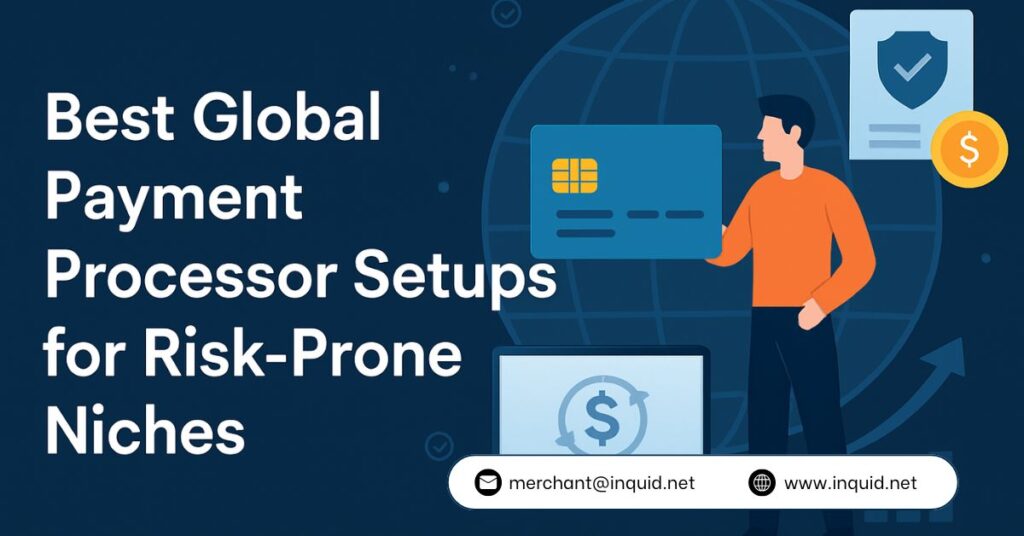
Running a business in a flagged industry is already an uphill battle. But once you start accepting payments internationally, that hill turns into a maze. Whether you’re operating in forex, adult content, gaming, casino, or IPTV, finding the right Global Payment Processor becomes critical because processors don’t treat your business like others, and your setup needs to reflect that.
What works for a standard eCommerce site won’t hold up for a risk-prone operation with global traffic, volatile transaction sizes, or cross-border compliance pressure. The difference between surviving and scaling often comes down to how you build your payment infrastructure.
Let’s look at what makes a global payment processor setup work for high-risk niches, and how to avoid the traps that many merchants fall into.
Why One Processor Is Rarely Enough
Banks and acquiring partners don’t all treat high-risk industries the same. A gateway that works in Germany may reject traffic from India. Some will block prepaid cards. Others may hold a rolling reserve of 20% or more.
Relying on a single provider exposes you to outages, geo-restrictions, and unpredictable approval decisions. That’s why most risk-prone merchants need a multi-processor setup built with geo-routing, failover support, and volume balancing.
With this kind of setup, you don’t just stay online—you keep approvals high and fees under control.
Key Components of a Risk-Ready Setup
1. Geographic Distribution
Split your acquiring across regions. If your primary traffic comes from Europe, route EU cards through an EU acquirer. If you serve LATAM, have a local processor ready for those BINs. This isn’t just about speed—it’s about approval rates.
2. Smart Routing Logic
Your gateway should make real-time decisions: which card goes to which processor. This helps avoid declines from country mismatches, blocked BINs, or card type incompatibility.
3. Risk-Specific Rulesets
Set velocity filters, transaction amount flags, and device tracking. Don’t rely on the processor alone to flag fraud—you’ll catch more false declines and reduce chargebacks.
4. Localized Payment Methods
Cards may be universal, but not every customer wants to use them. Especially in high-risk spaces, offering alternative payment methods can increase conversions and reduce disputes.
Best Gateway Features to Look For
Not all processors cater to high-risk industries. Look for gateways that support:
- Multi-currency acceptance
- Local and offshore acquiring
- Risk scoring and automated fraud tools
- API flexibility for custom routing
- 3D Secure 2.0 support for regions that require it
- Clear, transparent reserve policies
If you’re unfamiliar with how these setups operate, this guide on global payment processing offers a solid foundation.
Compliance Can’t Be an Afterthought
It’s not just about approvals. Running payments through non-compliant setups will lead to shutdowns. Make sure the processors you work with are PCI-DSS certified, offer clear onboarding documentation, and understand the rules tied to your vertical.
Especially for gambling, adult, or CBD merchants, global payment compliance isn’t optional—it’s survival.
Also, don’t ignore your internal compliance. Have your KYC documents in order. Keep records clean. Flag suspicious transactions before your processor does
Top Mistakes to Avoid
Going cheap on purpose – A low-fee processor that doesn’t specialize in your niche may cost more later in chargebacks, held funds, or a terminated account.
Using mainstream processors – Most popular names avoid high-risk entirely. Even if you manage to onboard, they can shut you down with zero notice.
Skipping alternative methods – In regions with low card penetration or high fraud, cards aren’t your best bet. E-wallets, crypto, bank transfers, and localized payment methods often yield better results.
For a full list of companies supporting these options, check out this guide on the best credit card payment companies for global merchants.
Final Thoughts: It’s a Setup, Not Just a Service
Global payment processing in high-risk markets isn’t about plugging in a provider and hitting “go.” It’s about building a system that fits your traffic, region, risk, and business model. Every layer matters—from routing logic to compliance.
If you’re unsure where to start or need a custom review of your current payment structure, the team at inquid can help. We’ve worked with merchants across gaming, casino, adult, forex, and more, helping them build Global Payment Processor setups that don’t just get approved but stay stable.
Need help configuring your ideal setup? Talk to us.
FAQ: Global Processors for Risky Niches
Which industries need specialized global payment setups?
Industries like adult, gaming, casino, betting, forex, IPTV, and nutraceuticals are commonly flagged as high-risk and need custom setups.
Can I get fast approvals with a global setup?
Yes—but only if your KYC docs are complete and you’re working with processors who accept your industry type.
Do I need multiple processors to operate globally?
You don’t have to—but relying on one will almost always reduce your approval rate and increase downtime risk.
